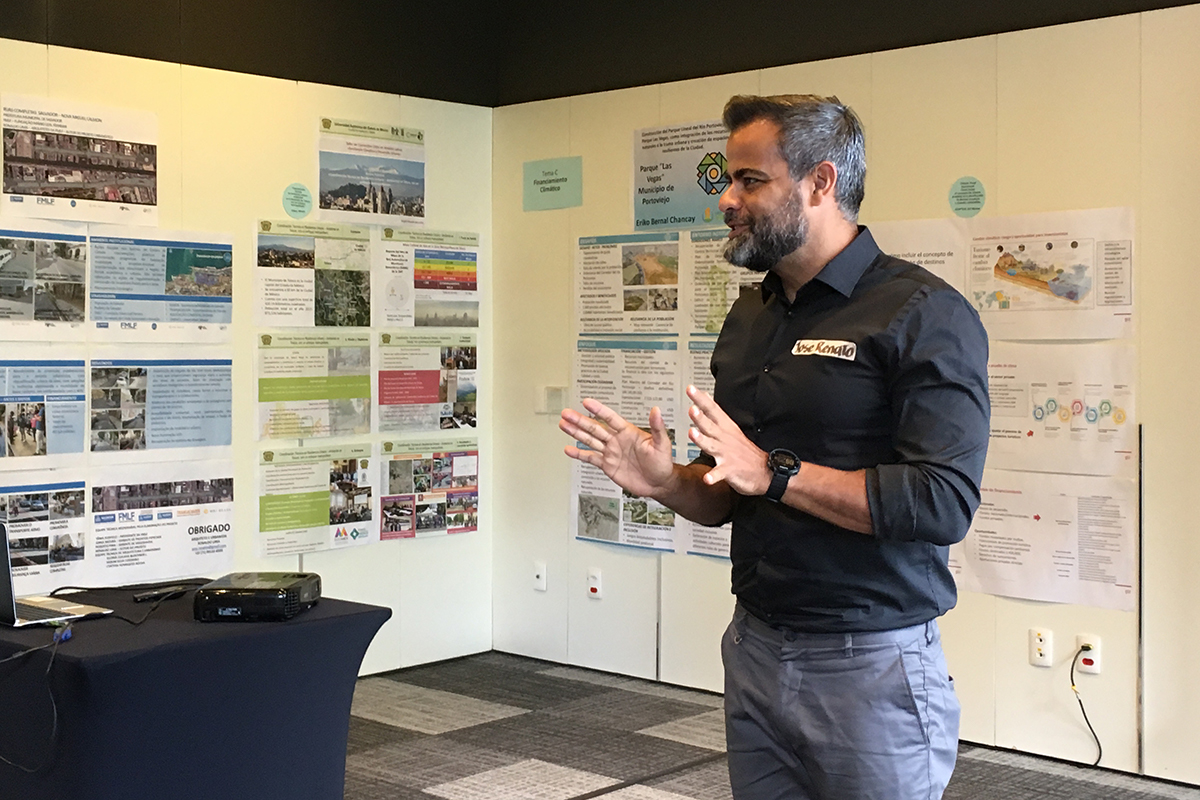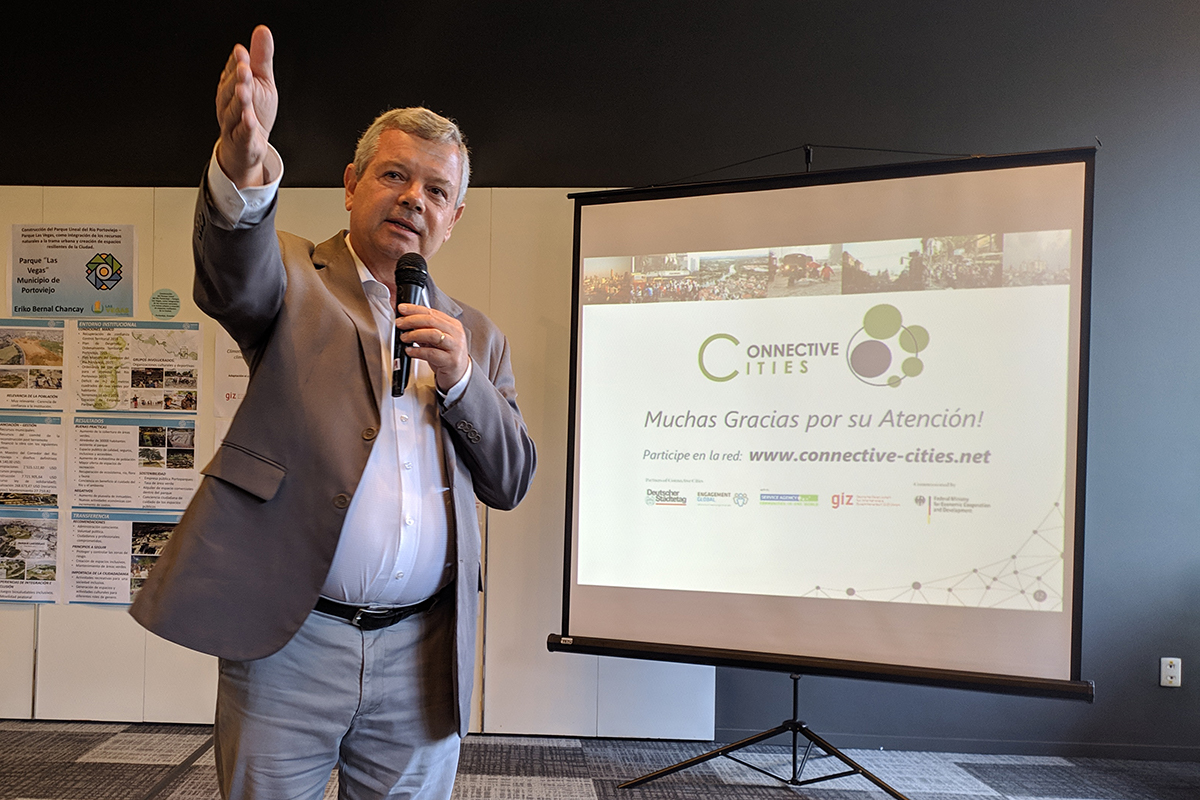- DE |
- EN
Connective Cities Dialogue Event in Niterói, Brasil
Overview
As a prelude to the new learning process of Connective Cities in Latin America, the dialogue event "Climate just and climate proof urban development" took place in Niterói, Brazil, from 26-28 November 2019. Cooperation partners of the event were the city of Niterói and UCLG Learning.
The 32 participants in the event, mainly local practitioners, came from 17 cities in six countries: Brazil, Germany, Ecuador, Colombia, Argentina and Mexico. All participants work in their cities or projects on the topic of climate resilience/climate adaptation in the context of sustainable urban development. The aim of the event was to exchange experience and knowledge among local practitioners on the subject, to get to know good practices and to give mutual advice to colleagues, as well as to develop project ideas for further processing in subsequent events.
During an excursion, the group first got to know some of the current and completed projects of the Niterói Municipality in situ, and then gained further insights during a meeting with the Mayor Rodrigo Neves.

Program
In order to address the broad field of urban climate resilience systematically and according to the demand in the region and partner wishes, four thematic areas were selected for the event:
A. Technological possibilities, risk and vulnerability assessment
B. Integrated and cross-departmental planning of municipal climate adaptation measures
C. Financing of climate projects
D. Citizen participation in climate governance and other aspects
With its diverse participants, the event created a platform for exchanging experiences, discussing challenges and generating ideas for a climate-friendly and climate-iliente urban development. The aim of the exchange was to learn about good practices from various communities. The main focus was on pragmatic solutions and approaches that can be applied or adapted to different regional contexts.
Keynotes
Juan Carlos Uribe
Plataforma Degeoinformaçãoda Prefeitura de Niterói
Experiencias en Connective Cities: El Apoyo de Proyectos Locales, Toluca, México
Rogelio Morales

Presentations
Präsentationen von Connective Cities
Connective Cities - una introducción
Alice Balbo
Perspectivas de cooperatión con Connective Cities
Alice Balbo
Projekte / Fallstudien
Working Group I: Posibilidades tecnológicas y evaluación de riesgos y vulnerabilidad
Cuencas Hídricas Urbanas - Paisajes del Agua, Paraná, Argentina Maria Eugenia Cichero
Maria Candela Gonzales
Gestão Integrada e tecnologias para a resiliencia, Curitiba, Brasil
Nelson Ribeiro
Katherine Arcila Burgos, Universidad Tecnológica de Pereira
Plano de Contingência de Inundação e Plano Municipal de Redução de Riscos, Rio Branco, Brasil
Adriana Valente de Oliveira
Working Group II: Planificación integrada e interdepartamental de medidas municipales de adaptación climática
O Plano Diretor de Niterói e suas estratégias de desenvolvimento urbano sustentável, Niterói, Brasil
José Renato Barandier Jr.
Victor Rico, Oficina de Resiliencia Urbana (ORU)
Plan Maestro de Cambio Climático Montería Ciudad Verde 2019, Montería, Colombia
Carlos Montoya
Michael Leischner
Working Group III: Financiamiento Climático
Nova Rua Miguel Calmon, Salvador, Brasil
Ronaldo Batista de Lima
Eriko Bernal
Fabián Trejo
Jhonny Marcelo Garcia
Working Group IV: Participación ciudadana en la resiliencia climática y otros aspectos
Training to become a Climate hero / Formación de héroes del clima, Stuttgart, Alemania
Regina Lüdert
Rogelio Morales
Walace Medeiros
Results
Apart from some presentations in the plenum and in groups, the event was above all characterised by a lively exchange and intensive dialogue. As is typical for Connective Cities events, the majority of the workshop took place in working groups. Synergies, parallels and potentials for the transfer of experience and knowledge quickly became apparent here. The participants therefore attached great importance to networking among themselves and to continuing the exchange after the event. One of the main findings in relation to the issue of urban climate resilience was the need to see crises as opportunities and to use the resulting opportunity windows to implement innovative or proven solutions that are otherwise difficult to implement. Ideally, a city can emerge from a crisis more resilient and environmentally friendly.
The project planning led to four concrete projects dealing with the improvement of the resilience of anthropic and ecological communities in risk zones (Ecuador), ecosystem-based climate adaptation in tourist destinations (Mexico), the adaptation of housing units to predicted temperature increases (Colombia) and the containment of landslide and fire risk in a socially disadvantaged urban district (Brazil).
During the excursion on the second day of the event, the participants were able to see with their own eyes current and completed projects of the Niterói Municipality. The excursion was led by Axel Grael, Head of Urban Planning. The group then met the Mayor of Niterói, Rodrigo Neves, who provided further background information on the city's planned and completed projects.
In addition to the exchange of technical know-how, solution options and planning instruments, the dialogue event has created a new transnational network of urban actors from Latin America and Germany, which can continue to grow and be consolidated within the framework of the joint learning process.

Report
Climate Resilience and Urban Development
2020 - UCLG Peer Learning Note #26




















